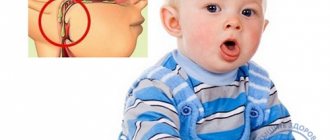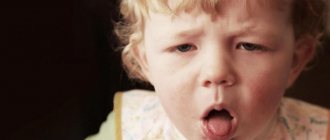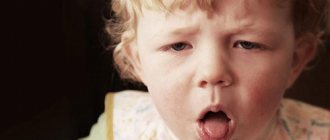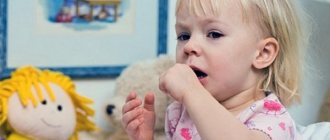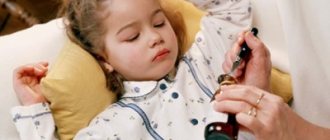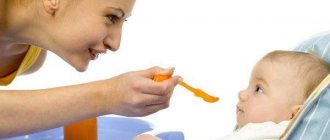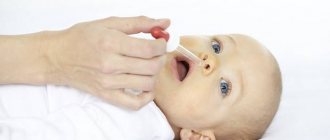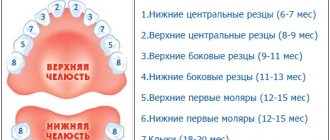To the question of how to treat a cough in a 9-month-old child, only a pediatrician can answer correctly. The specialist will draw up a treatment regimen for the baby, taking into account the origin of the cough and its type. When an infant coughs, they are prescribed pharmaceutical syrups for oral administration, inhalation, rubbing and massage. Some mothers do not want to visit a pediatrician and try to cure their baby’s cough with folk remedies. But home treatments in the form of rubbing and compresses should be taken only as an addition to drug treatment, otherwise the cough may take a chronic form.
Types of cough in children under one year of age and their consequences
By buying “any” cough syrup at the pharmacy for their one-year-old child, parents are putting his health at risk. The medicine must be purchased taking into account exactly what kind of cough is tormenting the baby. The cough reflex can be triggered not only by a cold, but also by the penetration of a foreign body into the respiratory tract. Therefore, consultation with a pediatrician should not be neglected.
Barking
The appearance of a barking type cough (rough, similar to an interrupted dog barking) indicates inflammation of the mucous membrane of the back wall of the pharynx and larynx. The condition is characterized by the absence of sputum. The airways are not cleared, which is why doctors call this cough reflex useless.
Coughing attacks are accompanied by a painful sensation and sore throat, sometimes vomiting. Up to one year old, babies have a narrower larynx than older children. Therefore, when the mucous membrane swells, they may experience difficulty breathing, which results in headache and general weakness.
If a barking cough is combined with an elevated temperature, this may indicate an infectious origin of the respiratory system disease (whooping cough, measles, scarlet fever). In this case, cough syrup alone is not enough.
Dry
A dry cough in a 9-10 month old child is paroxysmal in nature. Accompanied by the separation of a scant amount of mucus from the bronchi. This condition causes pain in the throat and chest. The cause of dry cough is most often colds, but it can also be caused by a number of other pathological conditions. For example, allergies to pollen, bacterial/viral infection and even worms.
Effective ways to treat wet cough in children
Cough with sputum production is a kind of protection of the body from irritating factors, allowing you to clear the airways. An infrequent cough is a normal phenomenon caused by the entry of microparticles of dust, tears or nasal mucus into the trachea.
If a frequent cough is accompanied by shortness of breath, wheezing, or fever, it is necessary to conduct a thorough diagnosis to identify the causes. Treatment is directly related to the symptom provocateur: allergic reaction, pneumonia, infectious process, bronchial asthma, etc.
Treatment
Since the muscle tissue of the respiratory organs is insufficiently developed in children, sputum separation is much more difficult than in adult patients. To facilitate the process, it is recommended to use mucolytic drugs that activate the production of mucus, which dilutes sputum . These drugs are differentiated into 2 groups:
- Herbal - “Pekitusin”, “Solutan”, “Doctor Mom”, breast mixtures;
- Synthetic - “Lazolvan”, “Ambroxol”, “Bromhexine”, ACC.
Herbal preparations are prescribed with caution so as not to accidentally provoke an allergy. Synthetic preparations can effectively cope with coughs, as they facilitate the passage of even soft sputum. Antitussives are not recommended. In this case, sputum will settle on the walls of the respiratory tract, which can cause complications of the disease.
A medical professional should prescribe medications, taking into account the child’s age and the severity of the process:
- From the 1st month of life, it is allowed to take Fluditec and Pectusin;
- Children from 3 months are usually recommended to take such drugs as “Mukaltin”, “Joset”, “Ambrobene”, “Bronchipret”, “Ambroxol”, “Bromhexine”;
- Starting from the 1st year, you can use Prospan, Linkas, Fluifort;
- Children over 1 year of age are prescribed the same pharmacological agents, increasing the dosage;
- At 2-3 years of age, mucolytic drugs are prescribed - Bromhexine, Ambroxol, ACC and others.
If the child has not reached 3 years of age, it is preferable to use combined vegetable syrups that have a pleasant taste.
How to cure a cough in a 9-10 month old child using pharmaceutical products
The doctor explains how to treat a cough in a 10-month-old child after listening to the baby’s lungs and bronchi. There is no single treatment regimen for wet or dry cough in children.
Mucolytics and expectorants
To thin mucus and remove it from the respiratory tract, children under one year of age are rarely prescribed mucolytic and expectorant drugs. Pediatricians explain this by insufficient development of the bronchi. Due to their narrow lumen, a separated lump of mucus can make breathing difficult. Therefore, the question of how to treat a cough in a 10-month-old child always requires the participation of a pediatrician. If the sputum is too viscous, cough treatment is carried out with plant-based syrups, under the supervision of a doctor.
One of these drugs is Prospan. The syrup is made from ivy leaf extract. The medicine has a cherry flavor. After oral administration, the drug relieves bronchospasm, reduces the viscosity of sputum, and promotes expectoration of mucus. Phytosyrup is contraindicated in case of allergies to its components; it is prescribed with caution in case of fructose intolerance. Dosage for children under one year: 2 times a day, 2.5 ml. The duration of treatment is determined by the doctor, the minimum course of treatment is 7 days.
Antitussive medicines
Sometimes it is difficult even for a doctor to understand how to treat cough in children under one year old. After all, coughing can be caused by various factors. Antitussive drugs are prescribed in cases where the cough is provoked by an allergy, helminthic infestation or other non-cold disease. Medications that suppress the cough center:
- Sinekod drops can be given to a child from 2 months. Every 6 hours 10 drops. Possible side effects: nausea and vomiting.
- Panatus syrup - allowed from 6 months, but according to doctor's indications. Dosage up to a year: 2.5 ml 3-4 times a day.
- Stoptussin drops are allowed for up to one year for babies weighing at least 7 kg. Prescribe 8 drops every 6-8 hours.
Children under one year of age have a weak cough reflex, which causes mucus to accumulate in the bronchi and cause shortness of breath. If a small child is given an antitussive drug, this will only worsen his health condition. It is also not recommended to take antitussive medications at the same time as expectorants.
Medicinal inhalations
A cough in a 9-month-old child can be treated with a nebulizer, but under the supervision of a doctor. The procedure is allowed from the age of six months:
- Warm medicine is poured into the compartment of the device (4 ml of saline solution and 5 drops of the drug Berodual). After turning on the device, the liquid turns into a spray.
- A mask is applied to the child’s face for a few minutes so that the nose and mouth are covered with it.
The total treatment time should be 5-7 minutes. Since it is difficult to distract a small child with anything, the procedure of inhaling healing fumes is carried out at intervals of several seconds (1-2 times a day) or the medicine is simply sprayed around the room where the child is.
Other options
Local warming preparations provide a quick effect for cold coughs, but they can only be used if the child does not have a fever.
Here are the 2 most effective:
- Doctor Mom - ointment can be used under the supervision of a doctor from infancy, provided that the child is not allergic to its components. The product has a positive effect on the respiratory organs during wet and dry coughing. In the morning and evening, it is rubbed into the chest and back, bypassing the heart area.
- Pulmex Baby - ointment is recommended from the age of six months. A small amount of the drug is rubbed into the skin of the back and chest, bypassing the heart area, 1-2 times a day. Then they put warm clothes on the child. The drug is contraindicated in children with individual intolerance to the components of the drug, as well as with a history of seizures.
Pediatricians recommend taking any warming ointment only as an adjuvant remedy.
Folk remedies to combat cough in children under 1 year of age
You can treat a small child’s cough at home only after the pediatrician has identified the cause of the disease and determined the type of cough. The doctor must approve the use of the folk remedy. It doesn’t matter that any particular recipe helped friends get rid of their child’s cough.
Decoctions and infusions of herbs
From 4 months, babies can be treated for cough with some herbal decoctions and infusions:
- Plantain, coltsfoot - herbs are mixed in equal parts. Pour 1 tbsp into a thermos. l. collection, pour 200 ml of boiling water. After 2 hours, filter. Give the child 1 tbsp. l. 15 minutes before meals 4 times a day.
- Mix elecampane, marshmallow and licorice roots in equal parts. Pour 1 tbsp into a glass jar. l. raw materials, pour 500 ml of cold water (purified or boiled), cover with a napkin. Strain after 8 hours. Give the baby 50 ml to drink 3 times a day.
Homemade syrups
With the permission of the pediatrician, children can be treated for cough with onion-honey syrup:
- Peel a medium onion and grate it on a fine grater.
- Add 4 tbsp to the onion pulp. l. natural honey.
- After 1.5 hours, squeeze out the juice using gauze.
Give medicinal syrup to the baby 0.5 tsp. 3-4 times a day until visible improvements occur. If an infant is allergic to honey, it can be replaced with sugar syrup. A cup of sugar is poured with the same amount of water and boiled over low heat until a homogeneous composition is obtained.
Carrot juice quickly removes mucus from the respiratory tract. For an infant, it can be diluted with natural honey or breast milk 1:1. Give 0.5 tsp to drink. 3-4 times a day.
Inhalations
Inhalations with an alkaline solution help make a dry cough productive. Borjomi or Essentuki mineral water can be used as such a solution:
- The bottle is left open for 2-3 hours to allow the gas to escape.
- The amount of water for which it is designed is poured into the nebulizer compartment.
- The child is allowed to breathe alkaline vapor for 5-7 minutes.
If you don’t have a nebulizer, you can boil mineral water in a closed saucepan. In order for the child to passively breathe in the steam, it must be opened in the room where the baby is. The procedure is repeated 5-6 times a day.
other methods
If a child has a cough without fever, then warm compresses can be used as an effective addition to drug treatment.
Best recipes:
- Camphor oil - before bed, rub the baby’s back and heels and wrap him warmly.
- Melted goat fat with honey. The ingredients are mixed in equal parts. The mixture is applied in a thin layer to the baby’s back, up to the last rib, avoiding the heart area. Compress paper is applied on top and a warm blouse is put on. Remove the compress after 2 hours. The procedure is carried out for 2-3 days in a row. The heels are lubricated only with fat, and socks are put on.
- Badger fat - used to rub the baby's chest, grab the front of the neck.
Doctors do not recommend placing a warm compress on the baby’s back and chest at the same time. This increases the risk of pneumonia.
Auxiliary procedures
Special massage techniques and a suitable indoor microclimate - these two factors contribute to the rapid cleansing of mucus from the respiratory tract.
Postural massage
Before the massage session, the child should be given an expectorant medicine prescribed by the doctor. Consecutive stages of massage:
- Using a pillow, the baby is placed on his stomach so that the chest is higher than the head.
- Use your palms to stroke the back in the lung area.
- Using camphor oil, rub for at least 5 minutes. The movements are performed with the palm from the lower back to the shoulder blades.
- Basic technique: fold your arms into a boat and lightly tap on your back for 5 minutes in the direction from the spine to the sides, from the lower back to the shoulder blades.
- The massage procedure ends with light soothing stroking, at which time the pillow is removed from under the child’s chest.
In mild cases of the disease, postural massage is performed once a day; in severe cases, at least 3 procedures per day are recommended.
Normalization of the indoor microclimate
The following will help ease the progression of the disease:
- regular ventilation of the children's room, provided that the environmental conditions outside the window are favorable;
- air purifier - useful in hot weather and when plants are in flower;
- air conditioning - turn it on for a short time in the heat;
- humidifier - necessary if the air humidity in the room is below 50%.
If a child has a cold cough in the summer, then it is better to live with the baby for a while in the country, where the air is much cleaner.
Causes of cough in a baby
Cough in children under one year of age can occur for several reasons. Sometimes this is due to the physiological structure of the respiratory tract. They are underdeveloped, and due to the regular horizontal position, mucus accumulates in the lungs. The spasm in this case is considered a reflex and should not cause panic among parents.
And not all mothers and fathers understand how to treat a cough if it is caused by harmful microorganisms. Pharmaceutical companies offer few medications for infant patients. Therefore, it is important to accurately establish the diagnosis and find out what caused the cough:
- Colds (ARVI) - in 85% of cases the cause of the disease lies precisely in this. With coughing there is a runny nose, fever and lack of appetite.
- Inflammation of the upper respiratory tract - in this case, the newborn baby suffers from a debilitating dry cough. If you do not take action, complications may arise - bronchitis or pneumonia.
- Drying of the mucous membrane due to excessively dry air in the baby’s room - in this case, there is no need to treat cough in children under one year old. Parents should purchase humidifiers and carefully monitor humidity levels.
- Ear inflammation – with such diseases, other unpleasant symptoms often occur – headaches, fever and nasal congestion. It is not difficult to determine the presence of the disease; you need to press on the earlobe. If the child begins to cry a lot, then the ear is inflamed and immediate treatment is required. The development of purulent formations will lead to deafness and unbearable pain.
- Allergic reaction - treatment of dry cough in this case is carried out with antihistamines. It is necessary to correctly calculate the dosage so as not to harm the baby. Allergies can develop to objects surrounding the baby - house flowers, dust, fragrances or fabric softener. We must not forget about down or wool, which is often used as a filler for blankets and pillows.
On this topic:
How to treat and what procedures to choose for a dry cough in a child
You can cure a cough using traditional methods or using medications from a pharmacy. Traditional therapy should only be carried out under medical supervision. Unconventional methods are more gentle, but many of them can cause allergies in a tiny patient.
Treatment of cough in a child in the first year of life
To the question of how to treat a cough in a 9-month-old child, only a pediatrician can answer correctly. The specialist will draw up a treatment regimen for the baby, taking into account the origin of the cough and its type. When an infant coughs, they are prescribed pharmaceutical syrups for oral administration, inhalation, rubbing and massage. Some mothers do not want to visit a pediatrician and try to cure their baby’s cough with folk remedies. But home treatments in the form of rubbing and compresses should be taken only as an addition to drug treatment, otherwise the cough may take a chronic form.
How to treat a runny nose and cough with sputum in a 9 month old child
Answers:
Sveta
I advise you as a pediatrician: Nazivin or Protargol for the nose, Lazolvan for cough. If the temperature rises, give paracetamol. But without seeing the child it is difficult to say anything. I still recommend calling a doctor to your home, the child is too small to let this matter take its course
omega
the pediatrician will answer. It depends on what virus. It’s always different.
MOTHER OF VANYA AND TANYA
“Lazolvan” syrup helps with cough, and Protargol, Nazivin for runny nose
Alyona Lyubimova
go to the pediatrician, he will tell you for sure and the sooner the better (pectusin alteyka bromine hexine berlinghimine)
PRINCESS FROG
Apply a generous amount of honey to your nose, dry the medicine! And at night, rub your chest and back with honey, cover with paper + a diaper = wrap up a woolen scarf or something warm so that you sweat. So at least for a minute. 3 nights!
Bum
Well, certainly not with advice from the Answers, it’s better to consult a doctor from a private clinic website, or better yet, go to a pediatrician))))))))))
Alexei
https://go.mail.ru/click?url=https://www.akusherstvo.ru/askvrach.php?id=42735&title=Question+for the doctor+>+Other+children+diseases+>+Hello. ++My+child+1+year+…+&ini=&rn=1
Tatyana Gazzal
Call your doctor, mine is also sick now, we do alkaline inhalation, then I rinse my nose and drip derinat, Lazolvan for cough
Personal Account Removed
1) If there is no temperature, then first steam it in the bathtub, where you drop 20 drops of fir oil (as soon as you drop it, immediately stir the bath, otherwise a burn is possible if the hot oil is on the child). Expectorants should not be given, otherwise the child will vomit after eating (after all, he cannot expectorate, and swallows both snot and phlegm). For coughs: the most proven method (with a small child) is to burn a teaspoon of sugar on a fire (burner) until almost black, dissolve in 1 tbsp. l cognac, shake everything, give the child 1 tablespoon at night. Don’t be afraid that if the dose is large, he will spit out some of it; it is better to cover the child’s nose in time to prevent him from spitting it out. There are a lot of tears, but the effect is amazing. And in general, if you give antibiotics, there will be problems with the muscle mass. And for the future, give your child baths with fir oil at least 2 times a week, and for yourself. This is a good prevention of all colds, and for women it is a panacea. The effect of rejuvenation of the body.
planeta
Phlegm in the throat is from a runny nose, roughly speaking it’s snot. Spray "Aqua Maurice" 2 times in one nostril and 2 times in the other. After 5 minutes, you suck it out with a small syringe and instill the cleaned nose with “protargol.” “Drip with protargol” 3 times a day, and clean it once. When you clean with a spray, the baby will cry a lot, but still clean it completely. They all cry from this procedure. It doesn't hurt, it's just very unpleasant. But how to treat a neck, it’s better to consult a doctor. They prescribe depending on how many months.
Approaches to the treatment of cough in nine-month-old children
It is believed that up to one year, children are not susceptible to colds and cannot suffer from cough, since mother's milk protects their body from infections.
However, this is not true. According to statistics, a cough in a child of 9 months or earlier appears even more often than in older children. The fact is that intensive teething during this period makes babies’ immunity weaker, and active study of the world around them causes various microbes to enter the body. Protecting nine-month-old babies from illnesses that cause coughing can be very difficult. Therefore, parents should prepare to eliminate this unpleasant symptom by all available means.
